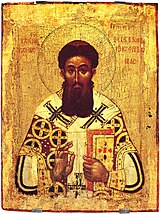| Part of a series on |
| Palamism |
|---|
 |
|
|
| Part of a series on the |
| Eastern Orthodox Church |
|---|
| Overview |
20th century Eastern Orthodox theology has been dominated by neo-Palamism, the revival of St. Palamas and hesychasm. John Behr characterizes Eastern Orthodox theology as having been "reborn in the twentieth century."[1] Norman Russell describes Eastern Orthodox theology as having been dominated by an "arid scholasticism" for several centuries after the fall of Constantinople. Russell describes the postwar re-engagement of modern Greek theologians with the Greek Fathers, which occurred with the help of diaspora theologians and Western patristic scholars.[2] A significant component of this re-engagement with the Greek Fathers has been a rediscovery of Palamas by Greek theologians; Palamas had previously been given less attention than the other Fathers.[3]
According to Michael Angold, the "rediscovery of [Palamas'] writings by theologians of the last century has played a crucial role in the construction of present-day [Eastern] Orthodoxy.[4]
- ^ Kallistos; John Behr; Andrew Louth; Dimitri E. Conomos (2003). Abba: the tradition of Orthodoxy in the West: festschrift for Bishop Kallistos (Ware) of Diokleia. St Vladimir's Seminary Press. p. 159. ISBN 978-0-88141-248-2.
- ^ Russell, Norman (2006). "Modern Greek Theologians and the Greek Fathers" (PDF). Philosophy and Theology. 18 (1): 77. doi:10.5840/philtheol20061814. Archived from the original (PDF) on 2011-10-07. Retrieved 2012-07-27.
- ^ Chrysostomos of Etna; Auxentios of Photiki; Akakios. Contemporary Traditionalist Orthodox Thought (PDF). Etna, California: Center for Traditionalist Orthodox Studies.
...Saint Gregory is not well known to the common pious, and his study by theologians is scant compared to the tomes that have been dedicated to the other Fathers. In Greece, it was not until the recent past that anyone showed any critical attention toward a collection of the Saint's writings. And, greatly owing to his rejection by the West and the proverbial "Western captivity" of many Orthodox theologians, some Greek theologians have only a rudimentary familiarity with Saint Gregory and his importance to Orthodox thought. (Happily, the state of Palamite studies in the Slavic traditions is better developed and more profound.)
- ^ Angold, Michael (2006). Eastern Christianity. Cambridge University Press. p. 101. ISBN 978-0-521-81113-2.
© MMXXIII Rich X Search. We shall prevail. All rights reserved. Rich X Search
